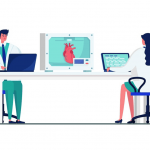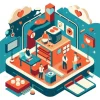
How Electronic Health Records Improve Patient Care?
Electronic Health Records (EHRs) are transforming healthcare by providing a comprehensive digital view of a patient’s medical history. These innovative systems enhance communication, streamline processes, and improve patient outcomes.
In this article, we’ll explore how EHRs revolutionize patient care, discuss their benefits, and address the challenges in their implementation. Discover the future of healthcare with EHRs and how they are shaping the industry for better efficiency and patient engagement.
Basics of Electronic Health Records
Electronic health records (EHRs) are transforming healthcare by providing a digital platform for patient information. This session will explore the fundamentals of EHRs, including their functionalities and benefits to patients and healthcare providers.
1. What are Electronic Health Records?
An Electronic Health Record (EHR) is a digital version of a patient’s paper chart. It’s real-time, patient-centered, and provides instant, secure information. EHRs contain medical histories, diagnoses, medications, treatment plans, immunization dates, and test results.
2. Evolution of Electronic Health Records
EHRs evolved from simple digital files to sophisticated systems. Initially, they stored basic patient information. Over time, they integrated with other health systems, offering decision support, alerts, and analytics.
How do Electronic Health Records Improve Patient Care?
Electronic health records (EHRs) are revolutionizing patient care. These digital tools boost efficiency, accuracy, and collaboration in healthcare, leading to better outcomes. Let’s explore how EHRs are making a positive impact.
1. Enhanced Access to Information
EHRs provide immediate access to patient data. Doctors can see medical histories, allergies, and previous treatments. This comprehensive view helps in making informed decisions quickly.
2. Improved Coordination of Care
Healthcare often involves multiple providers. EHRs ensure all providers have up-to-date information. This improves coordination, reducing errors and duplications. For instance, a primary care doctor can see what a specialist has prescribed.
3. Better Decision Making
EHRs support clinical decisions with evidence-based tools. They offer alerts about potential drug interactions and reminders for preventive care. These features help doctors make better, safer decisions.
4. Increased Patient Engagement
Patients can access their records through patient portals. They can see test results, request refills, and schedule appointments. This access empowers patients, making them active participants in their care.
5. Enhanced Communication
EHRs facilitate communication among healthcare providers. They can share patient information quickly and securely. This seamless communication is crucial in emergencies, where time is critical.
6. Improved Efficiency and Productivity
EHRs streamline administrative tasks. They reduce paperwork, minimize errors, and save time. Doctors spend less time on documentation and more on patient care. This efficiency improves overall productivity in healthcare settings.
7. Cost Savings
EHRs reduce healthcare costs. They minimize duplicate testing, lower transcription costs, and improve billing accuracy. These savings benefit both providers and patients.
Overcoming Challenges in EHR Implementation
EHR implementation unlocks advantages, but hurdles exist. This article explores common challenges and offers solutions for a smooth transition.
1. Data Security and Privacy
EHRs contain sensitive information. Ensuring data security is paramount. Healthcare providers must implement robust security measures to protect patient data.
2. Interoperability Issues
Different EHR systems must communicate with each other. Interoperability is crucial for seamless data exchange. Standardizing data formats and protocols can address this challenge.
3. User Training and Adoption
Healthcare providers need proper training to use EHRs effectively. Ongoing support and training programs help in smooth adoption. Addressing user concerns is also essential for successful implementation.
4. Initial Costs and Maintenance
EHR implementation involves significant initial costs. Maintenance and upgrades add to the expenses. However, the long-term benefits and cost savings outweigh these initial investments.
Future of Electronic Health Records
EHRs are in for a makeover! AI, data sharing, and a focus on patients will revolutionize healthcare, making it more efficient and empowering patients.
1. Integration with Emerging Technologies
EHRs will integrate with emerging technologies like AI and machine learning. These technologies will enhance data analysis, providing deeper insights into patient care.
2. Personalized Medicine
EHRs will play a crucial role in personalized medicine. They will help tailor treatments based on individual genetic profiles and health histories. This personalized approach improves treatment efficacy.
3. Improved Patient Portals
Patient portals will become more interactive and user-friendly. They will offer more features, like virtual consultations and detailed health analytics. This will further engage patients in their care.
4. Mobile Health Integration
EHRs will integrate with mobile health applications. Patients will track their health data on smartphones and sync it with their EHRs. This integration will provide a comprehensive health overview.
Conclusion
Electronic health records are transforming healthcare. They improve patient care by enhancing access to information, improving coordination, and supporting better decision-making.
Despite challenges, the benefits of EHRs are immense. As technology advances, EHRs will continue to evolve, further improving patient care.
Frequently Asked Questions? (FAQs)
What Is An Electronic Health Record?
An Electronic Health Record (EHR) Is A Digital Version Of A Patient’s Medical History, Maintained By The Provider Over Time.
How do EHRs Improve Patient Care?
EHRs improve patient care by providing immediate access to patient information, enhancing care coordination, supporting clinical decisions, and increasing patient engagement.
What Is The Future Of EHRs?
The future of EHRs includes integration with AI, personalized medicine, improved patient portals, and mobile health integration.
How Do EHRs Support Chronic Disease Management?
EHRs track patient progress and send reminders for check-ups and medication refills, improving disease management.
How Do EHRs Enhance Communication Among, Healthcare Providers?
EHRs facilitate quick, secure sharing of patient information among healthcare providers, improving communication and care coordination.
What Role Do EHRs Play In Emergency Rooms?
In emergency rooms, EHRs provide instant access to patient history, helping doctors make faster, more accurate diagnoses, which can be life-saving.
Enhance Patient Care and NABH Compliance with LazyMonkey
LazyMonkey is your all-in-one solution for improving patient care, retaining more patients, and meeting NABH standards. Our powerful QR-based feedback tool enables you to capture real-time insights from patient feedback, discharge surveys, staff and doctor evaluations, and clinical research, while also streamlining inter-departmental communication.
Transform your healthcare facility today - reach out to us at hello@lazymonkey.in, or request a demo here!
Elevate Your Restaurant Experience with LazyMonkey
LazyMonkey’s QR-based feedback system helps you gather real-time insights from customers, track satisfaction levels, and enhance the dining experience. Get instant feedback on your menu, service, and ambience, and make data-driven improvements to boost repeat customers and reviews.
Improve your restaurant today – reach out to us at hello@lazymonkey.in, or request a demo here!
Empower Student Engagement and Campus Improvement with LazyMonkey
LazyMonkey offers a seamless way to gather student feedback, track satisfaction, and enhance campus life. From course evaluations to dorm feedback, our QR-based solution makes it easy to capture valuable insights and improve student retention.
Upgrade your university experience – contact us at hello@lazymonkey.in, or request a demo here!
Streamline Feedback and Drive Performance Across Your Enterprise/Franchise with LazyMonkey
Whether you manage one or multiple locations, LazyMonkey’s QR-based feedback system helps you gather real-time employee and customer feedback. Improve operational efficiency, track satisfaction, and make data-driven decisions to enhance brand consistency and growth.
Transform your franchise today – reach out to us at hello@lazymonkey.in, or request a demo here!
Enhance Customer Satisfaction and Service Standards in Banking with LazyMonkey
LazyMonkey empowers banks to capture real-time feedback from clients across branches. Improve customer experience, assess service quality, and ensure regulatory compliance with our QR-based solution, helping you retain clients and meet banking standards.
Elevate your bank’s customer care – contact us at hello@lazymonkey.in, or request a demo here!
Boost Customer Engagement and Mall Satisfaction with LazyMonkey
LazyMonkey’s QR-based feedback tool enables you to collect feedback from shoppers, track satisfaction, and enhance the mall experience. Gather insights on store services, cleanliness, and entertainment to create an unmatched customer journey.











